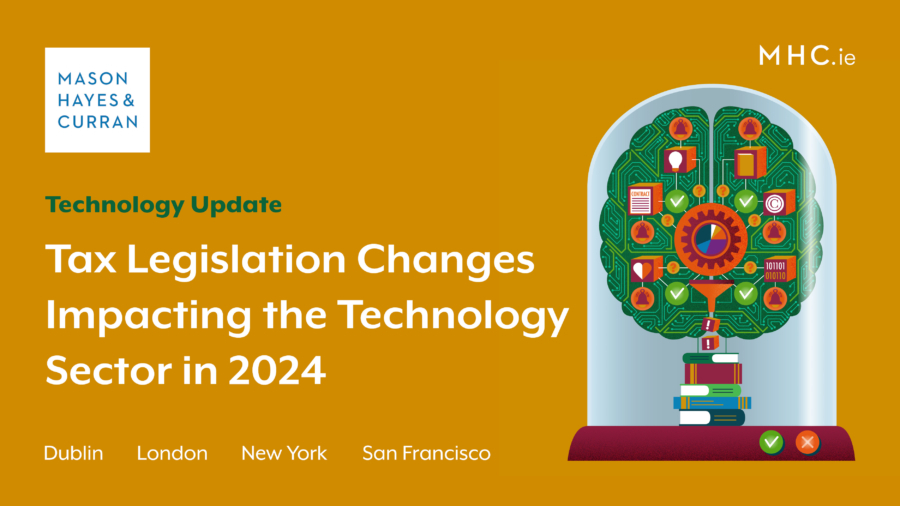
The 2023 Finance Act introduces a number of changes which will impact on Irish businesses and the economy. Our Tax team reviews some of the main changes, focusing on those which may affect businesses operating in the technology sector.
The Finance Act (No.2) 2023 (the Act) introduced several important changes to Irish tax legislation, including changes to integrate policies that have been driven at an EU and OECD level. We examine the scope of the most significant changes that businesses should be aware of for the coming year and beyond.
Pillar Two
Perhaps the biggest talking point from the Act for companies generally is its transposition of the EU Minimum Tax Directive 2022 (the Directive). This Directive introduced a framework for the implementation of the OECD Pillar Two agreement, known as the Global Anti-Base Erosion (GloBE) rules. The GloBe rules provide for a global minimum effective tax rate (ETR) of 15% on profits for businesses that have an annual group / global turnover in excess of €750 million and are relevant to the very largest multinational and domestic businesses that meet this threshold in at least two of the preceding four years. They come into effect for in-scope businesses with accounting periods beginning on or after 31 December 2023. The rules will represent a significant additional tax compliance burden for in-scope businesses.
In implementing the Directive, Ireland has elected to introduce a top-up tax, known as a QDTT under the Pillar 2 rules, which allows in-scope entities to pay additional tax in Ireland to bring their effective tax rate up to the 15% global minimum standard. This means that in-scope Irish-based group entities will pay a top-up tax to the Irish Exchequer, rather than to a tax authority outside of Ireland. In-scope clients will need to evaluate the potential impact of these rules, not just on their tax position but also on their compliance processes and systems.
Intra-group financing
The Act introduces new measures concerning the payment of interest, royalties or distributions to associated entities / companies located in no-tax or zero-tax rate countries or countries that are on the EU non-cooperative list. These provisions are designed to prevent so-called “double non taxation” i.e. an exemption from Irish withholding tax on payments which are not taxed in the hands of associated group companies due to the local tax rules in the relevant recipient country.
The new provisions do this by disallowing the usual exemptions from withholding tax on these payments from 1 April 2024. In the case of distributions caught by this new rule, they will be subject to Irish withholding tax generally where the income, profits or gains from which the distribution is made are not subject to taxation.
These new rules will impose a reporting obligation on the payor of interest, royalties or distributions for certain pre-existing arrangements from 1 January 2025. Where relevant, these provisions may have a significant impact on inter-group financing and clients may wish to consider potential re-structuring options.
Helpfully, the Act introduces a new measure providing for interest tax deductibility for a “qualifying financing company”. This measure applies to a company which raised third-party finance to on-lend to a qualifying subsidiary for that subsidiary’s trade. This is a welcome change which should assist financing and certain leasing operations.
Relief for R&D expenditure
The R&D tax credit, available to companies for qualifying spend on research & development activities, has been increased from 25% to 30% from 1 January 2024. Because the R&D tax credit is taxed as GloBE income this increase means that for Pillar Two in-scope businesses, the value of the tax credit is maintained at previous levels. Additionally, the first-year payment threshold has doubled to €50,000, which is a significant cash flow benefit to claimants. Previously companies could only claim up to €25,000 or 50% of an R&D credit claim in the first year.
From 1 January 2024, a pre-notification requirement is in place for companies intending to claim the R&D credit for the first time or who have not claimed the credit in the last three years. Revenue must be notified in writing 90 days before a claim is made and there are several confirmations / explanations a claimant must provide. Revenue may then request additional information so we would advise claimants to be prepared and ensure relevant documentation is maintained.
Digital Games tax credit
To ensure alignment with international definitions of refundable tax credits (such as under the GloBE rules) the Act makes amendments to the Digital Games tax credit. This relief was introduced in the Finance Act 2022 and is available to digital games development companies (DGDC) in the form of a refundable Corporation Tax credit of 32% on eligible expenditure.
From 1 January 2024, an eligible DGDC may claim payment of the credit or request that it be offset against tax liabilities, and such a claim will be paid or offset in full within 48 months of a valid claim. A DGDC must now carry on the trade of developing digital games for a minimum of 12 months prior to making a claim for the credit, and claims may not include expenditure that is met by grants or other assistance. There are also amendments to the time limits in which to make claims, the accounting periods that claims relate to and penalties and interest provisions, which we advise eligible clients to consider.
Relief for investors
An Angel Investor Relief has been introduced by the Act. This reduces the 33% rate of CGT for gains. Qualifying investors may avail of an effective reduced rate of CGT of 16%, or 18% where the investment is made through a partnership, on a gain up to twice the value of their initial investment. There is a lifetime limit of €3 million on gains to which this reduced rate will apply.
The key conditions for investments to qualify are that the investment must:
- Be made in a start-up which is an SME certified by Enterprise Ireland
- Be in the form of fully paid up newly issued shares of at least €20,000, or €10,000 - €20,000 where the investor holds a stake of at least 5%
- Represent not more than 49% of the ordinary issued share capital of the company, and
- Be held for 3 years.
The Act introduces a number of changes to the Employment Investment Incentive which provides tax relief for investments in qualifying companies. The required investment period is reduced to four years (previously it was seven) and the amount an investor can claim relief for is increased to €500,000. However, the rate of relief available is being reduced from the standard rate of 40% to 20% – 50%. This rate will depend on the status of the company seeking investment, and on whether the investment is made directly or through a qualifying investment fund. These changes apply from 1 January 2024.
Revenue compliance changes
The Act introduces a significant change to the taxation of share option schemes relevant to all companies that provide this form of employee share incentive. Employers are obliged to operate income tax, USC and PRSI on share option gains through the real-time PAYE system and to report on the exercise and/or grant of share options from 1 January 2024. This change is likely to result in a significant burden for affected employers operating existing share option schemes this year and beyond. We would advise our clients to review their obligations in this regard.
In addition, new rules on the enhanced reporting of employee benefits by employers, which were legislated for in the Finance Act 2022, have come into effect from 1 January 2024. This represents an additional unwelcome compliance burden for employers who will need to familiarise themselves with the new rules and ensure their internal procedures comply with these requirements.
Separately, another important change introduced by the Act is the possibility of a joint audit by the Revenue Commissioners and a tax authority of another EU Member State. Upon request by the other tax authority, Revenue may authorise a foreign tax official to be a ‘nominated officer’ for the purposes of a joint audit only. There are detailed measures in the Act in this regard, and we would recommend that any clients with cross-border activities should be aware of these measures.
Ones to watch
It is worth noting two other material developments in Irish tax on the horizon, namely a proposal to bring in a dividend participation exemption and new country-by-country reporting requirements.
A participation exemption for inbound dividends will be introduced in 2024. Adoption of a full dividend participation exemption regime in line with other EU and OECD countries is envisaged. This would represent a significant improvement in Ireland’s competitiveness and its attraction as a holding company jurisdiction.
The EU (Disclosure of income tax information by certain undertakings and branches) Regulations 2023, commonly referred to as public country-by-country, or CbC tax reporting obligations will apply from 22 June 2024. This means that corporate groups with an annual turnover of €750 million or more in each of two consecutive financial years will be obliged to publish certain information if they are either EU-parented or otherwise have EU subsidiaries or branches of a certain size. The report must include information on all members of the group (i.e. including non-EU members) and contain certain tax and other financial information about the activities performed in each country. However, importantly, the CbC reporting obligations will not apply to groups operating solely within a single EU Member State or to Irish branches where the net turnover does not exceed €12 million in the preceding two consecutive financial years.
For more information and expert advice on understanding and navigating the potential impact of these changes in 2024, contact a member of our Tax team.
The content of this article is provided for information purposes only and does not constitute legal or other advice.
Share this:







